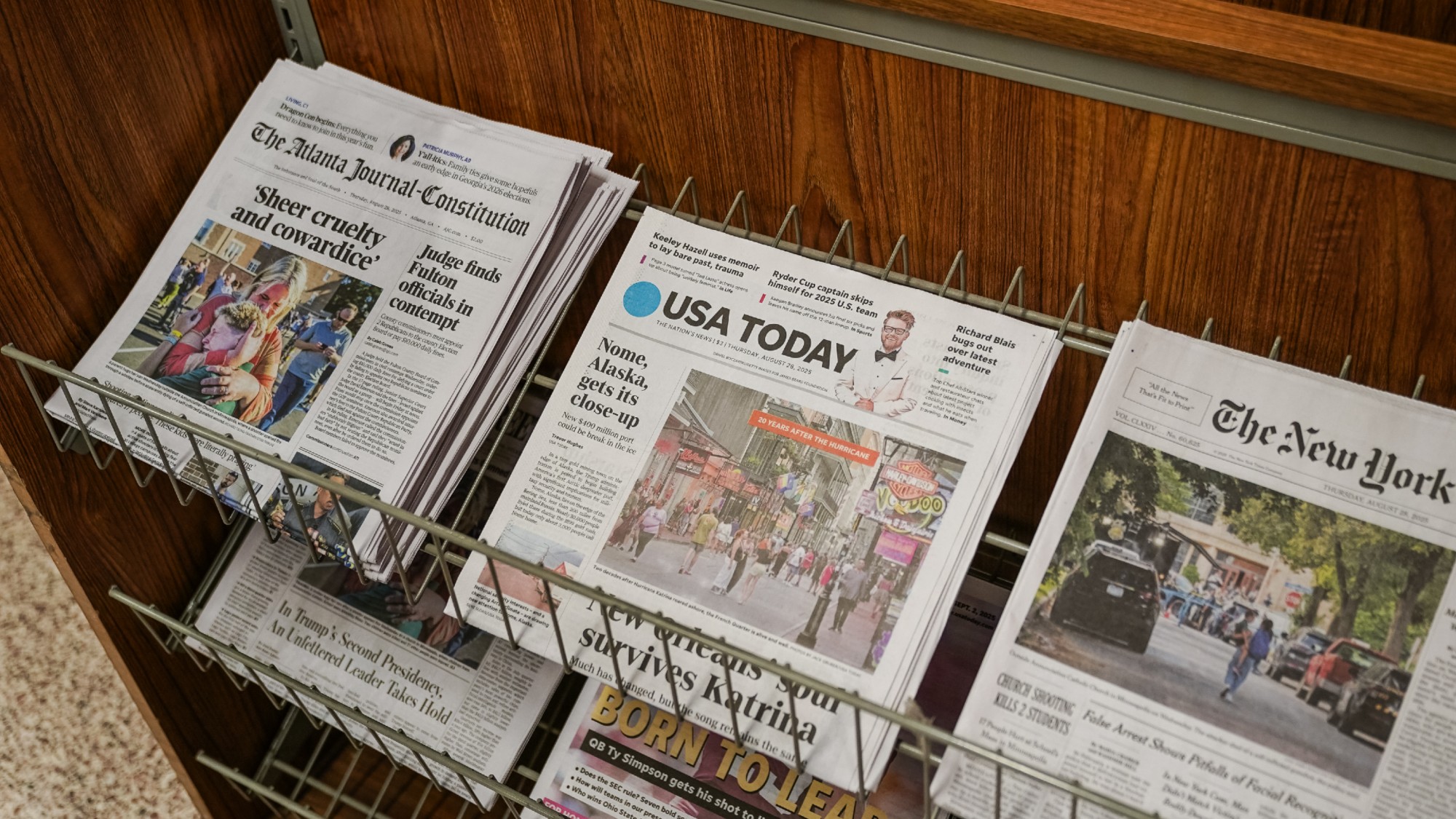Russians are filling America's news shortage
Fake news sites spread propaganda while real newspapers die


A free daily email with the biggest news stories of the day – and the best features from TheWeek.com
You are now subscribed
Your newsletter sign-up was successful
When is your local newspaper not your local newspaper? When it's actually a Russian disinformation operation. Many "local" sites have popped up in recent weeks — bearing names like the New York News Daily, the Chicago Chronicle and the Miami Chronicle — that are "meant to mimic actual news organizations to push Kremlin propaganda," said The New York Times. The fake news sites are a "technological leap" in the ongoing campaign to "dupe unsuspecting American readers."
It's not just happening in the United States. The Times report came a few weeks after France discovered a "vast network of Russian disinformation sites" operating in Europe, Le Monde said. The network of nearly 200 sites — called "Portal Kombat" by investigators — is "entirely dedicated to republishing and amplifying pro-Russian propaganda." The good news: "The audience for these sites seems very limited."
Back in America, though, the rise of Russian news sites runs headlong into the decline of local news sources. The country lost more than 130 print newspapers in 2023, The Conversation said, and nearly 2,900 newspapers have closed since 2005. That leaves "thousands of communities that simply do not have access to local news." Propaganda sites might be helping fill the vacuum.
The Week
Escape your echo chamber. Get the facts behind the news, plus analysis from multiple perspectives.

Sign up for The Week's Free Newsletters
From our morning news briefing to a weekly Good News Newsletter, get the best of The Week delivered directly to your inbox.
From our morning news briefing to a weekly Good News Newsletter, get the best of The Week delivered directly to your inbox.
'Divide and conquer'
"Chaos and disorder is the goal," Stew Magnuson said at National Defense. Russia appears to be "actively looking for communities where newspapers have disappeared" to fill the void with propaganda campaigns meant to "erode our confidence in democratic institutions." If so, the Russians have picked an easy target. "Newsrooms are being gutted" even in communities where local news organizations continue to operate. That leaves those communities relatively defenseless. "Divide and conquer is the strategy."
Research shows that the "decline of local journalism is associated with the drivers of disinformation," Jon Bateman and Dean Jackson said at the Carnegie Endowment for International Peace. That decline "contributes to civic ignorance and apathy" among voters, while "lower-quality information sources can fill the gap" for people looking for news. That breeds a "susceptibility to disinformation." And that will be a big challenge to change. "Reversing the decline of local journalism is an extremely costly proposition."
Bad actors are taking advantage. "Russia's 2024 election interference has already begun," NBC News said. While there are concerns about "deep fake" videos and audio entering the information ecosystem, the truth is that most of what Russia is doing is amplifying existing divisions — highlighting disagreements about immigration, for example. "They see whatever narrative is rising to the top," said Emerson Brooking, a senior fellow at the Digital Forensic Research Lab at the Atlantic Council, and "they try to push it."
'Faux local news'
"It's easy to create a website that looks legitimate," Poynter said. Stories from Russia's RT news service have been found at sites like Little Rock AR News and Albuquerque Breaking News, both parts of a network of "regional sites, national sites and faux local news sites targeting specific cities in the U.S." Sites like The Information Laundromat can help news consumers distinguish between real information and propaganda. But the problem will probably get worse, said information manipulation expert Peter Benzoni. "I think you're gonna see a huge increase in the types of people using these dissemination networks."
A free daily email with the biggest news stories of the day – and the best features from TheWeek.com
The latest spate of Russia-sponsored local news sites give "the impression of topicality" with regular updates about national news, The New York Times said, but they aren't really trying to fool "discerning" readers. (One site's "about" page is filled with "Lorem ipsum" dummy text.) The idea is to "lend an aura of credibility" to the disinformation, said Darren Linvill of Clemson University's Media Forensics Hub, helping it spread more easily to thousands, "even millions" of readers. It's "cheap, highly targeted and obviously effective."
Joel Mathis is a writer with 30 years of newspaper and online journalism experience. His work also regularly appears in National Geographic and The Kansas City Star. His awards include best online commentary at the Online News Association and (twice) at the City and Regional Magazine Association.
-
 The Olympic timekeepers keeping the Games on track
The Olympic timekeepers keeping the Games on trackUnder the Radar Swiss watchmaking giant Omega has been at the finish line of every Olympic Games for nearly 100 years
-
 Will increasing tensions with Iran boil over into war?
Will increasing tensions with Iran boil over into war?Today’s Big Question President Donald Trump has recently been threatening the country
-
 Corruption: The spy sheikh and the president
Corruption: The spy sheikh and the presidentFeature Trump is at the center of another scandal
-
 Big-time money squabbles: the conflict over California’s proposed billionaire tax
Big-time money squabbles: the conflict over California’s proposed billionaire taxTalking Points Californians worth more than $1.1 billion would pay a one-time 5% tax
-
 Did Alex Pretti’s killing open a GOP rift on guns?
Did Alex Pretti’s killing open a GOP rift on guns?Talking Points Second Amendment groups push back on the White House narrative
-
 Washington grapples with ICE’s growing footprint — and future
Washington grapples with ICE’s growing footprint — and futureTALKING POINTS The deadly provocations of federal officers in Minnesota have put ICE back in the national spotlight
-
 Trump’s Greenland ambitions push NATO to the edge
Trump’s Greenland ambitions push NATO to the edgeTalking Points The military alliance is facing its worst-ever crisis
-
 Why is Trump threatening defense firms?
Why is Trump threatening defense firms?Talking Points CEO pay and stock buybacks will be restricted
-
 ‘Despite the social benefits of venting, people can easily overdo it’
‘Despite the social benefits of venting, people can easily overdo it’Instant Opinion Opinion, comment and editorials of the day
-
 Trump considers giving Ukraine a security guarantee
Trump considers giving Ukraine a security guaranteeTalking Points Zelenskyy says it is a requirement for peace. Will Putin go along?
-
 ‘Journalism is on notice’
‘Journalism is on notice’Instant Opinion Opinion, comment and editorials of the day
